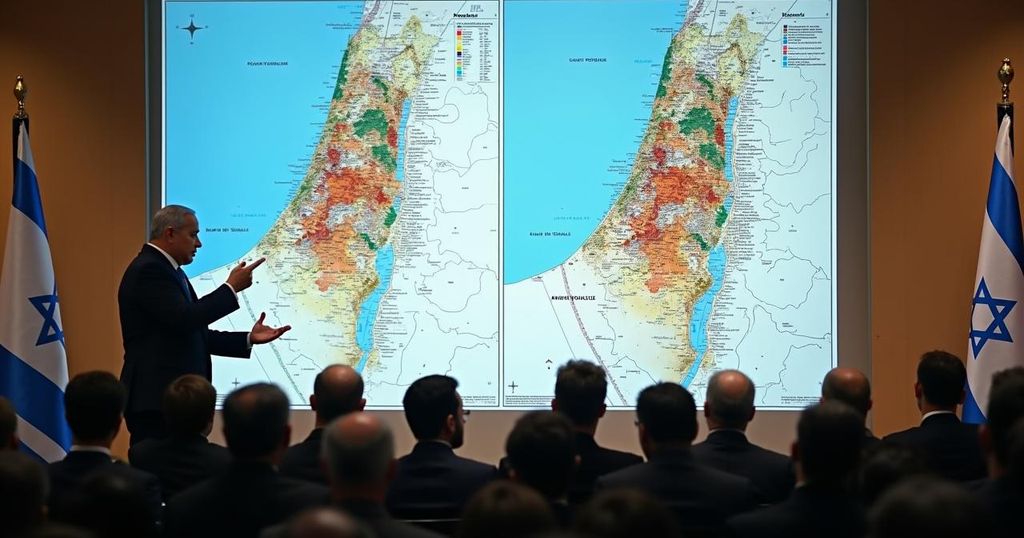Israeli Prime Minister Netanyahu Characterizes India and Iran During UNGA Address
During his address at the UNGA, Israeli Prime Minister Benjamin Netanyahu showcased two maps, designating India as a ‘Blessing’ and Iran as a ‘Curse.’ He advocated for sanctions against Iran and issued warnings regarding strikes on Israel, emphasizing the threat posed by Iranian influence in the Middle East amidst rising tensions following recent regional conflicts.
During a recent address at the United Nations General Assembly (UNGA), Israeli Prime Minister Benjamin Netanyahu presented two contrasting maps, referring to India as a “Blessing” and Iran as a “Curse.” This presentation coincided with escalating tensions between Israel and Iran. The map labeled “Blessing” depicted a vision of cooperation between Israel and its Arab allies, illustrating connectivity between Asia and Europe through a land route extending from the Indian Ocean to the Mediterranean Sea. In contrast, the “Curse” map illustrated what Netanyahu described as an “arc of terror” which Iran has purportedly exerted from the Indian Ocean to the Mediterranean. In addition to showcasing these maps, Netanyahu reiterated his call for international sanctions against Iran, asserting the necessity to curb its nuclear weapons program. He stated emphatically, “For too long the world has appeased Iran; it turns a blind eye to its internal repression and external aggression. That appeasement must end and that appeasement must end now,” underlying his administration’s stance against Iranian influence and aggression. Further addressing the situation, Netanyahu warned of severe consequences should Iran engage in hostilities against Israel. He conveyed, “I have a message for the tyrants of Tehran. If you strike us, we will strike you. There is no place in Iran where the long arm of Israel cannot reach. And that is true for the entire Middle East.” The context of this warning is rooted in the complexity of regional relations, particularly following the assassination of Hamas leader Ismail Haniyeh in Tehran and Iran’s strong rebukes of Israel’s military actions in Lebanon, which it condemned as a “flagrant war crime.”
The geopolitical landscape of the Middle East is characterized by longstanding tensions, particularly between Israel and Iran. In recent months, these tensions have intensified due to various factors, including military confrontations and assassination operations involving key leaders. The assassination of Hamas chief Ismail Haniyeh in Tehran has further strained relations, prompting Iran to respond vehemently against Israeli actions, including airstrikes in Lebanon targeting Hezbollah. In this context, Prime Minister Netanyahu’s statements at the UN underscore Israel’s strategic alliances and its efforts to rally international support against Iranian operations that are viewed as aggressive and destabilizing across the region.
In summary, Israeli Prime Minister Benjamin Netanyahu’s address at the UNGA highlighted the contrasting perceptions of India as a positive ally versus Iran as a significant threat. The presentation of the two maps served as a visual representation of Israel’s diplomatic stance, advocating for sanctions against Iran while calling for regional unity against instability propagated by Iranian influence. Netanyahu’s explicit warnings signal Israel’s preparedness to respond decisively to any threats, further complicating the already fraught relationship between the two nations and their regional allies.
Original Source: www.hindustantimes.com




Post Comment